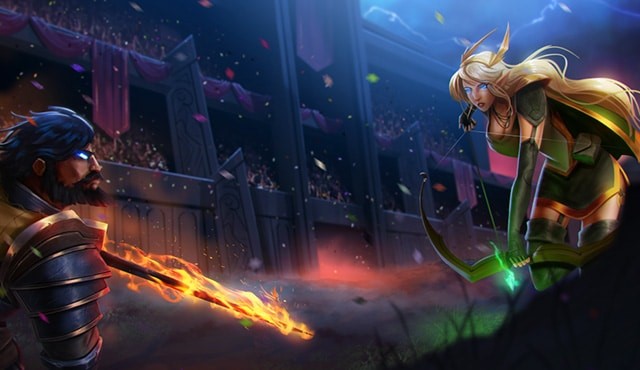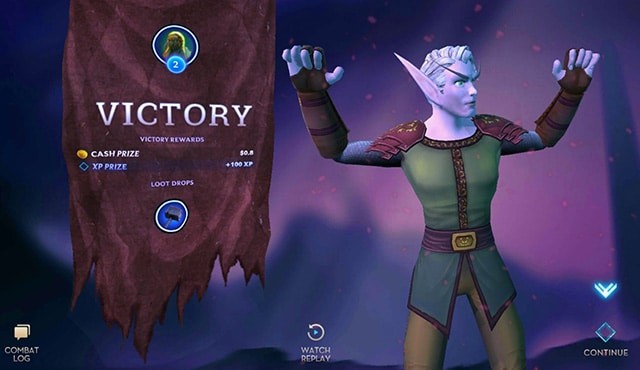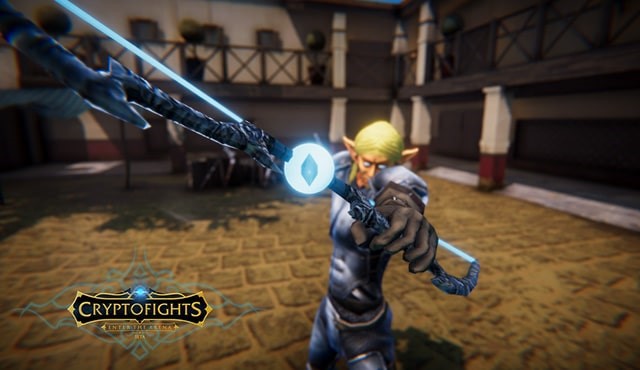As the eSports industry continues to grow in both prominence and popularity, blockchain gaming platform FYX is seeking to bring fairness, integrity and new methods of monetisation, to a burgeoning sector using BSV.
‘How we got started originally was while we were creating the game CryptoFights back in 2017,’ explains FYX founder and CEO Adam Kling.
’Since then, the project has changed its ambition and we have a goal now of being one of the leading examples of how blockchain technology can be implemented.’
CryptoFights is an online role-playing game built entirely on the BSV blockchain. Currently in its beta stage of development, CryptoFights capitalises on different elements unique to the blockchain – incorporating verifiable results, wagering on matches and a system of in-game item ownership.
‘We started to think beyond just making CryptoFights because of the technical breakthroughs that we were making and problems we were solving as we developed it,’ says Kling.
‘That got us thinking about how these breakthroughs could be used for other games being developed, but then we took that one step further when we realised that this technology could be applied to the wider eSports industry right now.’
As the eSports industry continues along a steep growth trajectory – with direct revenues tipped to top $2.3 billion by 2022, more than Formula One or the UEFA Champions League – business models are being forced to adapt on the fly, while service providers across the ecosystem emerge in an effort to capitalize on the new economies apparent.
‘In eSports at the moment, a lot of the money being generated is from advertising and sponsorship. Big publishers with massive followings create huge events, where they put millions of dollars into a prize purse and fill stadiums with thousands of fans,’ explains Kling.
‘That draws teams, who in turn get sponsorships and attract advertisers – so there’s a lot of money that is being generated in the same way as traditional sports. If you look at the traditional sports world where they have that type of structure, that’s the direction that eSports is going at the moment, which is what I see as more of a legacy system.’
Kling envisions a different future for eSports, one that leverages the inherent advantages it has compared with traditional sports – namely, accessibility and low barriers to entry.
‘I see a different direction for eSports and where this huge industry is going, as for me, the strength of eSports is the ability to play from home: I can compete as a professional player and I can make a living doing it,’ says Kling.
‘With FYX, we are providing a dedicated eSports platform that will allow developers to monetise their games in new ways – with features related to in-game items and game integrity.’
Changing the game
FYX proposes to change the eSports landscape through three core pillars: items, integrity and income – all of which are made possible by harnessing the power and unique capabilities of the BSV blockchain.
‘The eSports industry has a lot of cheating – that just happens in video games in general – but it becomes more of an issue with competitive gaming and is an issue that we are seeking to solve with FYX,’ explains Kling.
‘There have been instances where semi-pro or top-end players have thrown matches, having bet against themselves to win – throwing the match and profiting from losing. If you have things like this running rampant, you lose the integrity of the games and you risk losing chunks of the eSports market including betting, which is already generating billions every year.’
When a game or tournament is played using the FYX platform, all the elements of a match are recorded to the blockchain through a transaction, creating a permanent record of the game and its inputs, while also enabling features of smart contracts, such as pay-outs for wagers on games.
FYX is designed as a gateway to link games and tournaments with the BSV blockchain. The platform keeps latency and costs low by consolidating records of matches into small transactions that are secured immutably on the blockchain. This removes any incentive for cheating, as it makes it readily apparent when it occurs – ensuring that a record of the game remains that can be publicly verified.
‘With no database that can be altered behind closed doors, and with all of the data publicly available and verifiable, game integrity takes on a new look immediately,’ says Kling.
‘What we have is effectively a validator, that is validating the game state and updating what is happening – and anyone can see if someone is cheating, because they are able to see the data that has been input into it.’

Player details are recorded when they are onboarded onto the platform, linking their identity on the blockchain with their real identity. This makes it trivial to spot and root out bad actors.
‘When we onboard people onto the platform, we also run a player’s account through KYC [know your customer] so that we know the true identity of that player. This gives us a chain all the way down to the real identity so if players do cheat, that is immediately stored on the BSV blockchain and can be audited by anyone,’ says Kling.
‘Being caught cheating will follow that player through every single game they play on the platform – so what it does is create all of this risk for a prospective cheater. It doesn’t matter if they play one hundred games and cheat in one, we will know. That can subsequently end in you banned from every game on the platform – or worse, facing criminal penalties because of the substantial amount of money involved in some of these games.’
FYX also provides wagering facilities for cash games, enabled by the BSV blockchain’s support for micropayments through its low transaction fees and high throughput capacity. This enables the company to create an environment with games that have verifiable results, provable integrity and cash prizes – effectively allowing professional eSports matches to take place anytime and anywhere.
‘The cost of playing in an unranked, non-cash match with verifiable integrity is going to cost fractions of a cent,’ says Kling.
‘In our ranked mode, there is a cost of entry for matches – it might be 10 cents, it might be $5 each for twenty players – with cash prizes distributed to the winners. In these games, we take a 10 percent cut of the prize pool as our operator fee, a percentage of which we pass directly to the developer of the game – giving developers a new revenue stream for their games too.’
NFTs and in-game items.
Another key component of the FYX platform is its support for the tokenisation of in-game items on the BSV blockchain as non-fungible tokens (NFTs). These tokens are essentially data objects that are written to the blockchain using the same underlying security as its native currency. Developers can create NFTs representing in-game items that are then distributed to players through gameplay or other means. Players then have full control over their in-game items, even if the game they are designed to work within is no longer functional, and they can trade them freely for digital currency or other items on any compatible exchange.
‘How in-game items work now is that I go into my game and I pick my item that I want to buy, whether that’s a skin or a new character, then I pay that game developer or publisher to get access to that item in the game. If I ever lose my account or I can’t get back in for whatever reason, then I no longer have that item. I’m essentially paying for the access to that item – like renting it,’ says Kling.
‘With the blockchain however, we can change this. When you think about BSV, the whole idea underpinning it is that when you have a [digital token], it’s yours, it’s in your wallet. It’s the same thing with items that are stored on the blockchain – you actually own it and it can’t be replicated. There is provable scarcity and you have the ability to use it, sell it or trade it in much the same way.’

‘What we see is that gamers love to collect. They love to be able to sell the items back to earn some of their effort back in real dollars, with speculative value on items and the marketplace trading them a big deal in many games,’ says Kling.
FYX is therefore leveraging the public validation and security of the blockchain to not only securely record gameplay events and tournament logs, but also to let players truly own their game items for the first time.
‘What we are really doing is creating a new ecosystem of trade. You can essentially have a stock market for game items. This is already happening on the blockchain and is one of the more proven applications of gaming on the blockchain.’
While they may only have relevance in-game, digital items can translate to eye-watering real-world valuations – with the price of weapons and skins regularly reaching into the thousands of dollars, while pieces of virtual real estate have previously been sold for more than $6 million. By using the approach of FYX however, the pundits trading in these digital assets can derive ownership rights independent of the games’ ecosystem – with the asset itself stored on the blockchain.
‘One of the ways that our platform differs is by using BSV we can store more data than other blockchains can. So for example, if we had a weapon for a game – on the blockchain we can store the 3D model, the textures, the sounds for how that weapon works in the game – and that is a digital asset that is stored on the blockchain forever and its owner owns every part of that asset,’ says Kling.
‘On other blockchains, using Enjin tokens on Ethereum for example, it’s just not possible to store all of the data for in-game items on the chain, which means that the 3D model and textures exist with the game developer – so if they want to change how it looks or how it works, they can do so – and that might invalidate the value of the item when it is traded. But with our system, everything is immutable, right down to the item itself.’
FYX has been hard at work developing tools and platforms for video game developers and players alike – creating the FYX Gaming SDK to allow developers to easily integrate their games with the BSV blockchain and an online game item explorer and marketplace for players to view and trade their in-game items across titles.
The company is also working on tools for developers to allow them to create their own NFTs that can be used in their blockchain-based games, and it is continuing to develop CryptoFights, which will be compatible with all aspects of the FYX ecosystem.
Breaking boundaries with BSV
‘I looked into [blockchain] back in 2013 and I thought it was a really cool technology, but it was all about the payment functionalities of it and it kind of went sideways for me until I saw CryptoKitties hit the headlines,’ says Kling.
‘When I saw a CryptoKitty traded for $100,000, it showed me a proof of concept that there was real value in digital scarcity and non-fungible tokens. That started off the race for blockchain gaming and was also when I started my project.’
Kling started work on his first blockchain-based gaming product shortly thereafter with CryptoFights, a turn-based combat game presently in beta testing.
‘Originally we started coding CryptoFights with Ethereum. That’s where a lot of the development activity was happening at the time, as the development community was focused there – and for good reason – the other blockchains weren’t really there yet… but when we began coding, we started to run into a lot of complex problems,’ says Kling.
‘We wanted to run our game on the blockchain, but with how this was being done on Ethereum, it was creating a lot of issues for us where we were worried about the cost of transactions and the speed of transactions, which would restrict the types of games we would be able to run.’
The limitations of the Ethereum network for projects in the video game and eSports space is well-documented and has resulted in many developers moving away from the platform. When CryptoKitties was at the height of its popularity, the Ethereum network was overwhelmed by the number of additional transactions being generated, increasing both the price of transacting and the time taken for all transactions across the network to confirm.
‘When I looked at the scaling roadmap of Ethereum, it became clear that we were never going to be able to have a million players playing on FYX. Instead, everyone is having to develop layer-two technologies and are only submitting the results to the Ethereum blockchain. With BSV, we wouldn’t have to do that,’ Kling says.

A year into the project, Kling – and then CryptoFights – shifted their project from Ethereum and began the process of moving it to the BSV blockchain, a major decision in the roadmap for the early-stage start-up, but one Kling is confident was the right move for their business and its future prospects.
‘When we first started hearing about BSV, we had a look and a colleague of mine realized that it solved everything for us. We were working on what’s called a DAG – a directed acyclic graph – to use in a layer-two system, which was a really complex solution to the limitations that Ethereum posed. With BSV, we suddenly realised that we wouldn’t need it anymore,’ explains Kling.
‘What was important for us was that the consensus layer on the BSV blockchain is different than on Ethereum, which means that it can be on the client side. We went from there and when we really got stuck into it, it was like having a whole new programming language to use.’
By transitioning from Ethereum to BSV, the scope for the project expanded exponentially, as Kling and his team got a handle on the potential of the BSV blockchain. Instead of developing a blockchain-based video game, FYX was created – bringing with it a vision to create a platform with the potential to change not just how eSports are played, but to broaden the user-base by making professional-tier features accessible to all.
‘When we started working with BSV, we realised just what was possible and I started thinking about all of the things that could be done in the gaming world with eSports. BSV really was the inspiration to create FYX, because it was the foundational component we needed to build what we wanted to build,’ says Kling.
‘[The BSV blockchain] is much cheaper than Ethereum and it’s more flexible for us. We also have the ability to partner with transaction processors like TAAL to negotiate a monthly fee for our transactions if they have the hash power – so that gives us a level of economic freedom that we didn’t have with Ethereum, which further helped our business case.’
Kling says that the technology and platform is in place with BSV to establish FYX as a game-changer for eSports – with a first-mover advantage over potential competitors helping position the company at the forefront of any sector-wide shift.
‘We are a part of the Blockchain Game Alliance and a lot of the members are still on the Ethereum side,’ says Kling.
‘It shows to me that they are still dealing with a lot of those same limitations that we did and are having to design around those limitations. Our back-end technology is just so far ahead of them because of that, and I think our switch to BSV is going to end up being one of our big achievements.’